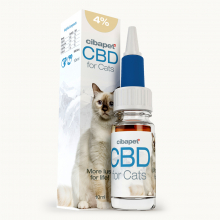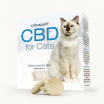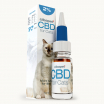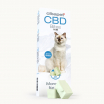Can You Rub CBD Oil on Cats' Ears?
Published:
Cannabidiol, or CBD, has become a popular supplement for humans in recent years, touted for its many potential health benefits. But what about our feline friends - can cats also experience positive effects from CBD? Specifically, is it safe and effective to rub CBD oil on cats' ears? Let's take a closer look at this question.
Contents:
- What is CBD Oil?
- How Does CBD Work in Pets?
- Is CBD Safe for Cats?
- What Are the Potential Benefits of CBD for Cats?
- Can You Rub CBD Oil on a Cat's Ears?
- How Do You Give CBD Oil to Cats?
- Should You Try Rubbing CBD Oil on Your Cat's Ears?
- Frequently Asked Questions
- The Takeaway
- Questions About Using CBD Oil for Cats
- Is CBD oil safe for my cat?
- What dose of CBD should I give my cat?
- How should I give CBD oil to my cat?
- How long does it take for CBD to work in cats?
- Can I rub CBD oil on my cat's skin or ears instead?
- Is CBD oil legal for pets?
- Can CBD oil interact with my cat's medications?
- What conditions can CBD potentially help with in cats?
- Are there any side effects I should watch for?
- Should I give CBD to my cat long-term or as needed?
- What should I look for in a quality CBD product?
- Summary
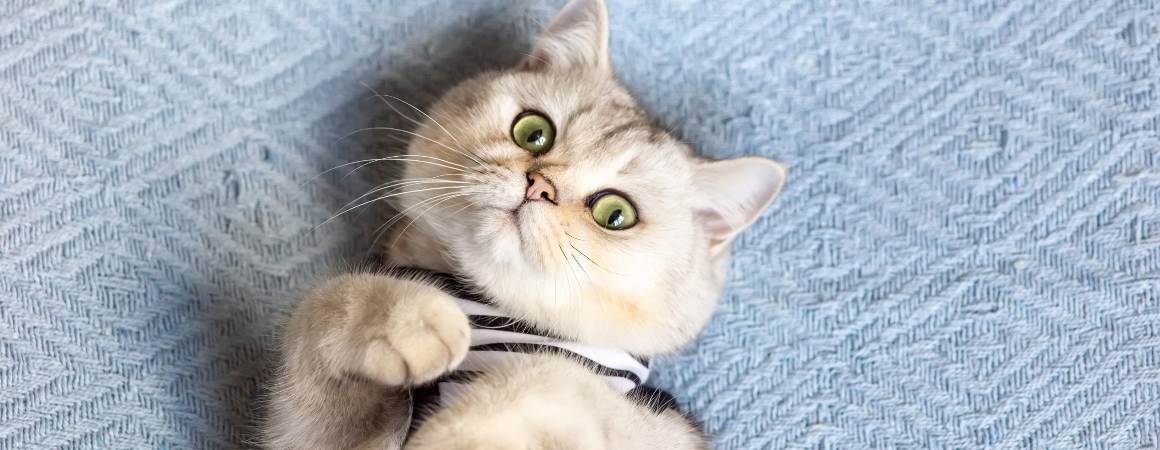
What is CBD Oil?
CBD is one of over 100 chemical compounds called cannabinoids found in the cannabis plant. Unlike the famous cannabinoid THC, CBD is non-psychoactive, meaning it does not cause any intoxicating effects.
CBD oil is an extract of the cannabis plant that contains high concentrations of CBD. After being extracted, it is diluted with a carrier oil like coconut oil or hemp seed oil to create CBD oil.
CBD can be derived from both marijuana and hemp plants. However, most CBD products for pets are sourced from hemp rather than marijuana, as hemp contains higher levels of CBD and lower levels of THC.
How Does CBD Work in Pets?
All mammals, including cats and humans, have an endocannabinoid system (ECS). The ECS regulates various bodily functions and helps maintain homeostasis.
This vital system is involved in regulating pain, mood, memory, immune response, sleep, appetite, and more. It works largely through endocannabinoids - signaling molecules that bind to cannabinoid receptors throughout the body.
Plant-derived cannabinoids like CBD can also influence this system by binding to cannabinoid receptors. Although more research is still needed, CBD may help support the ECS to promote balance and optimal health.
Is CBD Safe for Cats?
Research on CBD safety in cats is limited. However, most evidence suggests CBD is well-tolerated by cats when used responsibly under veterinary guidance.
Potential side effects appear mild. In doses higher than recommended, CBD may temporarily cause lethargy, vomiting, or changes in appetite. Always talk to your vet about proper dosing for your cat.
It's also crucial to choose high-quality CBD products designed for pets. Avoid any product containing THC, as this cannabinoid is toxic to cats. Full-spectrum CBD retains trace amounts of THC, so broad-spectrum or CBD isolate formulas are safest.
Overall, current research suggests CBD is much safer for cats than many conventional drugs, when used properly. Still, more studies are needed to fully understand the effects.
What Are the Potential Benefits of CBD for Cats?
While more research is needed, current evidence points to several promising benefits of CBD for cats:
Pain Relief
Cats can experience pain from injuries, arthritis, cancer, and other conditions. CBD may help relieve pain by reducing inflammation and interacting with endocannabinoid receptors involved in pain processing.
One study found CBD reduced signs of osteoarthritis pain in dogs. While we can't yet extrapolate these results to cats, they appear promising. More research is underway.
Anxiety Relief
Loud noises, travel, vet visits, and other stressors can trigger anxious behaviors in cats like hiding, aggression, urinary issues, and overgrooming. By supporting the endocannabinoid system, CBD may help relieve anxiety and calm stressed cats.
Supporting Immune Health
The ECS plays a role in regulating the immune system. Some research shows CBD can suppress overactive immune responses and reduce inflammation. This may support cats with inflammatory disorders or weakened immune systems.
Anti-Nausea
Cats prone to travel sickness or nausea from treatments like chemotherapy may benefit from CBD's anti-nausea effects. CBD is already used for reducing chemotherapy-induced nausea in humans.
Promoting Homeostasis
By supplementing the ECS with plant cannabinoids like CBD, we may support overall balance in the body and various physiological processes tied to the ECS. More studies are underway to explore CBD's benefit for homeostasis in cats.
Again, more clinical trials are still needed to confirm CBD's safety and efficacy for these uses in cats. But early findings are promising. Always chat with your vet first before giving CBD to your cat.
Can You Rub CBD Oil on a Cat's Ears?
Now that we've covered the basics of CBD for cats, let's return to the original question. Is it effective to give CBD oil to cats by rubbing it on their ears?
Skin absorption is one potential way to administer CBD to pets. Some pet CBD products come as topical creams, sprays, and balms meant to be rubbed into the skin.
Certain areas of the body, like the inside of the ears, have thin skin and blood vessels near the surface. Applying CBD oil here may allow it to absorb into the bloodstream more quickly than other areas.
However, absorption still appears relatively low and variable compared to ingestion or inhalation. One study applied CBD gel to rats and found less than 10% was absorbed into the bloodstream.
More research is needed on transdermal CBD absorption in cats. But so far, rubbing CBD oil on the ears isn't supported as an effective method. Oral ingestion of CBD oil or treats has more evidence for delivering a consistent, absorbable dose.
How Do You Give CBD Oil to Cats?
Instead of applying CBD oil topically, giving it to your cat by mouth is the best absorption method. Here are some tips:
- CBD oils and tinctures: Use dropper to apply oil directly into the mouth or mix into food. Start with just 1-2 drops.
- CBD pet treats: Easier to give than oil for fussy cats. Ensure accurate dosing for the treat size.
- Compounded CBD preparations: Your vet can provide custom CBD formulas suitable for your cat. Useful for cats who won't take oil/treats.
- Always follow product dosing guidelines. Overdosing may cause lethargy and GI upset. Start low and slowly increase if needed.
- Give CBD with food to boost absorption and avoid stomach upset.
- Consistency is key. Administer CBD oil at the same times daily to keep a steady level in the body.
Talk to your vet about the right CBD dosage and administration method for your cat. Start low and monitor effects closely. Report any side effects or lack of desired effects to your vet promptly.
Should You Try Rubbing CBD Oil on Your Cat's Ears?
While rubbing CBD oil on a cat's ears is unlikely to provide much benefit, CBD oil itself may still be helpful for cats when given properly by mouth.
As we've explored, preliminary research suggests CBD may safely deliver several potential perks for feline health and wellness when used as a supplement. Always chat with your vet first to see if CBD could be right for your cat's needs.
If you decide to try CBD with your cat, choose high-quality, veterinary-approved products and carefully follow dosing guidelines. Monitor your cat closely and report any concerns promptly.
With safe and responsible use under veterinary supervision, CBD oil may provide supportive health benefits for some cats. But more clinical trials are still needed to better understand CBD's effects in cats.
In summary, rubbing CBD oil on your cat's ears does not appear an effective approach based on current data. There are better ways to administer CBD if you want to explore its potential upsides! As always, check with your veterinarian first before introducing any new supplements.
Frequently Asked Questions
Still have questions about using CBD for cats? Here are answers to some commonly asked questions:
1. Is CBD oil legal for cats?
In most places, yes, as long as it's sourced from hemp and contains 0.3% or less THC. CBD products with higher THC content are still considered illegal at the federal level. However, laws are rapidly evolving, so check your own state. Some veterinarians may also choose not to recommend CBD currently due to legal uncertainties.
2. What conditions might CBD help with in cats?
Research suggests CBD may potentially help relieve pain, anxiety, nausea, inflammation, and other health issues in cats. However, more clinical studies are still needed. Chat with your vet about whether CBD could be beneficial for your cat's specific health conditions.
3. Can CBD oil hurt my cat?
When used properly under veterinary guidance, CBD appears very safe for cats. But too high of a dose may cause lethargy, vomiting, or other mild side effects. THC in high doses can be toxic to cats, so always choose THC-free formulas. Start with low doses and monitor your cat. Discuss any concerns promptly with your veterinarian.
4. How much CBD oil should I give my cat?
There are no official dosing guidelines for cats yet. Most experts recommend starting with 1-5 mg CBD per 10 lbs body weight twice daily, and gradually increasing every 2 weeks if needed. Always follow product guidelines and consult your vet on the right dosage for your cat. Start low and go slow!
5. How long does it take for CBD oil to work in cats?
Effects may be noticeable within 30 minutes to a few hours, but optimal benefits often take 2-4 weeks of consistent daily use. Track how your cat responds over time and adjust the dosage and frequency with your vet if needed. Be patient, as it may take some trial and error.
The Takeaway
While an intriguing prospect, rubbing CBD oil on your cat's ears does not appear an effective delivery method based on current data. Instead, administering CBD oil by mouth following proper dosing guidelines shows more promise.
Always check with your veterinarian before giving any CBD products to your cat. Research on CBD for cats is still emerging. But preliminary studies suggest it may provide supportive health benefits for some cats when used responsibly under medical supervision.
Questions About Using CBD Oil for Cats
CBD oil is growing in popularity for use in cats, but there are still many common questions cat owners have. Here are detailed answers to some of the most frequently asked questions about CBD for cats.
Is CBD oil safe for my cat?
CBD is generally well-tolerated by cats, but there are a few precautions to take. First, always choose hemp-derived CBD products without THC, as THC is toxic for cats. Start with low doses and monitor your cat for any side effects like lethargy or stomach upset. Increase slowly if needed. CBD may interact with some medications, so always consult your vet first. With responsible use under veterinary supervision, CBD is considered far safer for cats than many conventional medications. But more studies are still needed.
What dose of CBD should I give my cat?
There are no official dosing guidelines for CBD in cats yet. Most experts recommend starting with 1-5 mg CBD per 10 lbs of body weight, twice daily. Then gradually increase every 2 weeks by 1-2 mg per dose if needed. For example, a 10 lb cat may start with 2 mg CBD twice daily and later increase up to 9 mg twice daily. Always follow product guidelines and consult your vet on the ideal dosage for your cat based on their condition. Proper dosing is key for both effectiveness and safety.
How should I give CBD oil to my cat?
The most effective method is orally, by mouth. Use a dropper to administer CBD oil directly into your cat's mouth, or mix into wet food. CBD pet treats are another convenient option, just ensure accurate dosing for the treat size. Some vets may compound customized CBD preparations for fussy cats. Never give CBD oil meant for humans, as dosing differs. Always give CBD with food to increase absorption.
How long does it take for CBD to work in cats?
Effects may be noticeable within 30 minutes to a few hours, especially for anxiety or pain relief. But for conditions like inflammation or nausea, optimal benefits often take 2-4 weeks of consistent use to fully kick in. Track your cat's symptoms and adjust the dosage gradually if needed. Responses vary between cats. Patience and consistency are key. Consult your vet if you don't see a desired effect after 4-6 weeks.
Can I rub CBD oil on my cat's skin or ears instead?
Absorption via the skin is very low and unpredictable compared to giving CBD orally. There's no evidence showing rubbed CBD oil is effectively absorbed into the bloodstream. Oral administration ensures accurate dosing and optimal absorption. Rubbing CBD oil on the ears or skin is unlikely to provide benefits. Stick to giving CBD by mouth.
Is CBD oil legal for pets?
In most U.S. states, hemp-derived CBD oil with under 0.3% THC is legal, as it's derived from hemp, not cannabis. But laws vary by state and are rapidly changing. Always check your own state laws. Some vets may still be hesitant to recommend CBD due to legal uncertainties, though this is improving. The legal status of CBD remains complex.
Can CBD oil interact with my cat's medications?
CBD can potentially interact with certain medications through effects on liver enzymes. This is more likely at high doses. That's why it's crucial to discuss using CBD with your vet first if your cat takes any medications. Your vet can advise you on potential interactions and help find the ideal dose to minimize risks. Never give CBD to your cat without veterinary approval if they take other meds.
What conditions can CBD potentially help with in cats?
Research suggests CBD may help with pain, inflammation, nausea, anxiety, seizures, cognitive dysfunction, and more. However, most studies are still pre-clinical or limited. There's more evidence for certain uses like pain than others. Your vet can advise you on whether CBD could benefit your cat's specific health condition based on the current research. Most potential uses still need stronger clinical confirmation in cats.
Are there any side effects I should watch for?
At appropriate doses, CBD is very well-tolerated in most cats. But some may experience mild effects like temporary lethargy, vomiting, diarrhea, or lack of appetite. These resolve quickly with dose reduction. Seek immediate vet care if side effects persist or worsen. Also monitor your cat's symptoms closely for desired effects. Report lack of improvement to your vet promptly as well.
Should I give CBD to my cat long-term or as needed?
For chronic conditions, most experts recommend consistent, long-term administration for optimal effect. For situational issues like travel anxiety or nausea, as-needed use may be appropriate. Your vet can advise you on the best dosing schedule for your cat based on their health needs. Consistency is important for many uses, as it allows optimal buildup in the body over time. But some cats may need only occasional CBD dosing.
What should I look for in a quality CBD product?
Always select CBD products designed specifically for pets, not humans. They have completely different dosing needs. Look for organic hemp-derived formulas without THC or contaminants. Choose liquid formulations with measurable dosing like oils, suspension, or treats over topicals. Review third party lab test reports when available and ensure the formula matches what's advertised. Consult your vet on reputable brands they recommend or approve.
Summary
While more clinical research is still needed, current evidence suggests CBD oil may provide supportive health benefits for cats when used responsibly under veterinary supervision. Talk to your vet about whether CBD could be right for your cat's needs. Responsible use requires accurate dosing, high quality products, and monitoring for side effects. Most importantly - always get your veterinarian's approval before giving CBD to your cat!









